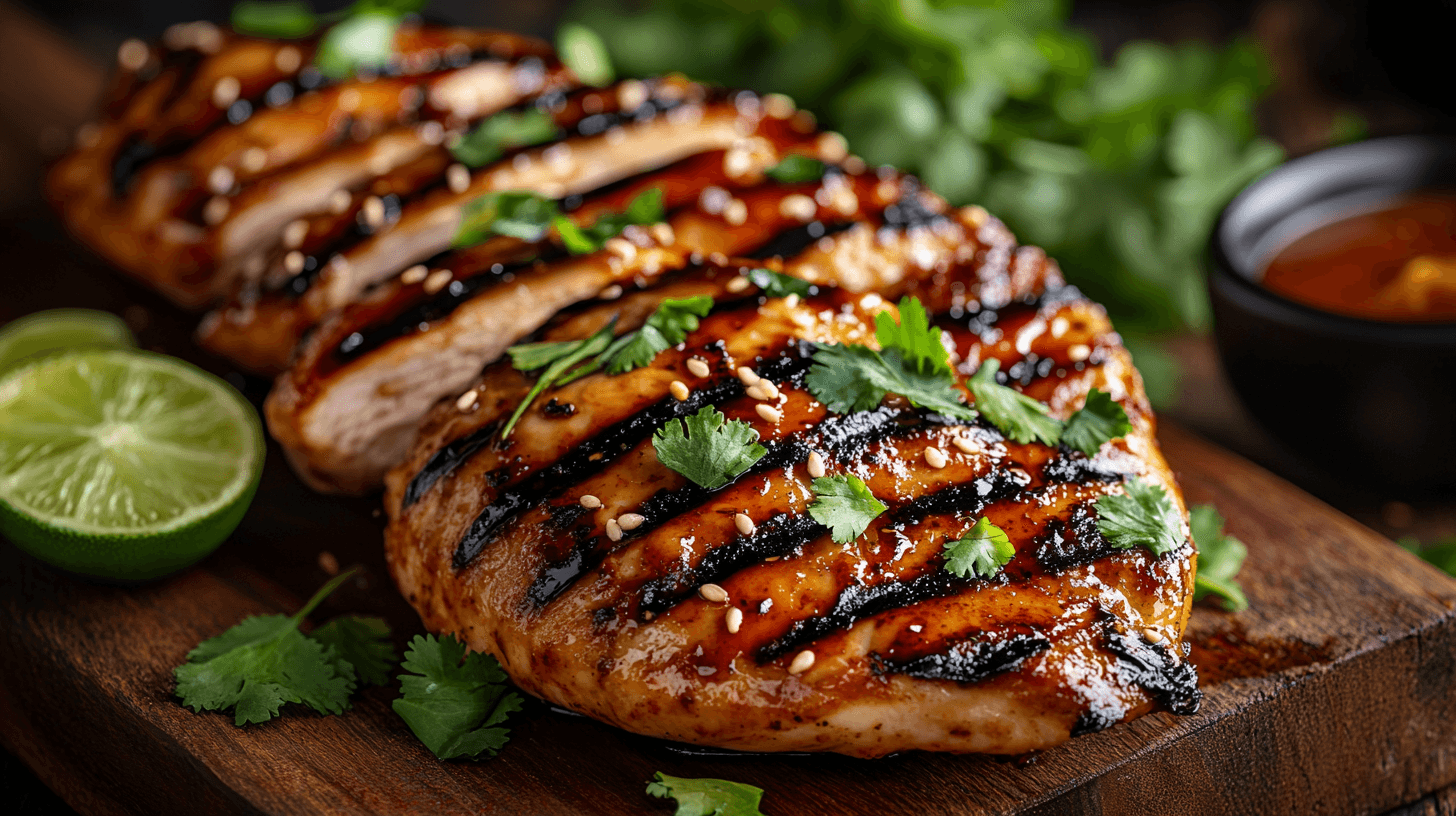Table of Contents
Asian chicken marinades are a culinary secret weapon, turning a simple piece of chicken into a savory, flavorful delight that stands out in any meal. Whether you’re grilling outdoors, baking for a cozy family dinner, or stir-frying for a quick weeknight dish, a good marinade not only enhances taste but also tenderizes the meat to perfection. This article will walk you through everything you need to know about creating the ultimate Asian chicken marinade, including classic recipes, key ingredients, cooking tips, and more.
What is an Asian Chicken Marinade?
At its core, an Asian chicken marinade is a carefully balanced blend of ingredients that represent the diverse and vibrant flavors of Asian cuisine. By combining elements of salty, sweet, tangy, and spicy, these marinades bring a depth of flavor to chicken that is both versatile and universally appealing.
An Asian chicken marinade often reflects the culinary traditions of specific regions—be it the rich soy-based marinades of Chinese cuisine, the spicy-sweet blends of Korean cooking, or the light and citrusy profiles of Thai dishes. These marinades are not limited to chicken; they can also be adapted for other proteins and vegetables, but chicken remains the most popular choice due to its ability to absorb flavors effectively.
Why Use a Marinade for Chicken?
Marinating chicken is more than just soaking it in a flavored liquid. It’s a transformative process that affects the texture, juiciness, and overall taste of the meat. Here are some compelling reasons to marinate:
- Flavor Penetration: Marinades introduce bold flavors that go beyond the surface of the meat.
- Tenderization: Ingredients like vinegar, citrus juice, or yogurt break down tough fibers, resulting in tender meat.
- Moisture Retention: Oils and other liquids help lock in moisture, preventing the chicken from drying out during cooking.
- Versatility: With a single marinade, you can prepare chicken for grilling, baking, stir-frying, or even air frying.
Essential Ingredients for an Asian Chicken Marinade
Creating an Asian chicken marinade is all about striking the right balance between four primary taste components: sweet, salty, tangy, and spicy. Let’s take a closer look at the key ingredients that make these marinades shine:
- Soy Sauce: A cornerstone of Asian cuisine, soy sauce provides the salty, umami base. Opt for light soy sauce for mild flavors and dark soy sauce for a richer, caramelized taste.
- Sesame Oil: A drizzle of sesame oil adds nutty depth and aroma.
- Ginger and Garlic: These two aromatic powerhouses give the marinade warmth, complexity, and authenticity.
- Sweeteners: Brown sugar, honey, or maple syrup balances the saltiness of the soy sauce and adds a subtle caramelization when cooked.
- Acidity: Rice vinegar or lime juice helps tenderize the chicken and brightens the flavors.
- Chili or Spice: Whether it’s sriracha, chili flakes, or gochujang (Korean chili paste), heat adds a bold kick to the marinade.
Optional Additions:
- Fish Sauce: Adds depth and a slight brininess, often used in Thai and Vietnamese marinades.
- Hoisin Sauce: A sweet and savory addition that’s perfect for glazing.
- Lemongrass: A fragrant herb commonly found in Southeast Asian dishes.
The Science Behind Marinades: How Do They Work?
Understanding the science of marinades can help you perfect your recipes. Marinades work by altering the protein structure of the meat. Acidic components like vinegar or citrus juice break down muscle fibers, making the meat more tender. Meanwhile, salt in soy sauce penetrates the meat through osmosis, enhancing both flavor and moisture retention.
However, it’s important to note that over-marinating can have adverse effects. If chicken sits in an acidic marinade for too long, it can become mushy rather than tender.
Classic Asian Chicken Marinade Recipe
Ingredients:

- ½ cup soy sauce (light or dark)
- 3 tbsp sesame oil
- 2 tbsp rice vinegar
- 3 cloves garlic, finely minced
- 1 tbsp fresh ginger, grated
- 2 tbsp brown sugar or honey
- 1 tbsp chili paste (optional)
- 1 tsp ground black pepper
Instructions:
- In a mixing bowl, combine all the ingredients. Whisk until the sugar dissolves and the mixture is smooth.
- Place the chicken pieces in a resealable plastic bag or a shallow dish. Pour the marinade over the chicken, ensuring it’s evenly coated.
- Seal the bag or cover the dish with plastic wrap. Refrigerate for at least 30 minutes, but for the best flavor, aim for 6–12 hours.
- When ready to cook, remove the chicken from the marinade and pat it dry with paper towels. Cook using your preferred method—grilling, baking, or stir-frying.
Adjusting Flavors to Suit Your Palate
One of the beauties of an Asian chicken marinade is its adaptability. You can easily adjust the ingredients to create a flavor profile that suits your preferences:
- For more sweetness: Add extra honey or brown sugar.
- For spiciness: Increase chili flakes, sriracha, or gochujang.
- For tanginess: Add a splash of lime juice or more rice vinegar.
- For depth: Mix in hoisin sauce, oyster sauce, or a touch of fish sauce.
Taste as you go to ensure the flavors are well-balanced.
Cooking Methods for Marinated Chicken
Once your chicken has absorbed all the wonderful flavors of the marinade, it’s time to cook it. Here are the most popular methods:
- Grilling: The high heat of a grill caramelizes the sugars in the marinade, creating a charred, smoky flavor.
- Baking: Oven-baked chicken stays juicy and requires minimal effort. Roast at 400°F (200°C) until the internal temperature reaches 165°F (74°C).
- Stir-Frying: Perfect for bite-sized pieces of chicken, stir-frying locks in moisture while creating a savory, glossy coating.
- Air Frying: For a healthier option, use an air fryer to achieve crispy skin and juicy interiors with minimal oil.
Pairing Asian Chicken Marinade with Sides

The right side dish can elevate your marinated chicken into a complete, satisfying meal. Here are some classic pairings:
- Rice: Jasmine rice, fried rice, or even coconut rice complement the bold flavors of the marinade.
- Noodles: Lo mein or soba noodles tossed with vegetables and sesame oil make a perfect side.
- Salads: A fresh Asian slaw with cabbage, carrots, and sesame seeds balances the richness of the chicken.
- Vegetables: Stir-fried or roasted broccoli, bok choy, or snap peas add crunch and nutrition.
Common Mistakes in Marinating Chicken
Avoid these pitfalls to ensure your chicken comes out perfectly every time:
- Overmarinating: Too much time in the marinade can break down the meat excessively, leading to a mushy texture.
- Uneven Coating: Always ensure every piece of chicken is fully submerged or coated.
- Skipping the Resting Step: Let chicken rest for a few minutes after cooking to retain its juices.
Asian Chicken Marinade for Meal Prep
Asian chicken marinades are ideal for meal prepping. Marinate multiple portions, then cook and store them in airtight containers. These are some tips for storage:
- Refrigeration: Store cooked chicken in the fridge for up to 4 days.
- Freezing: Marinate raw chicken, then freeze it in a resealable bag for up to 3 months. Thaw overnight before cooking.
FAQs
How do I make a gluten-free Asian chicken marinade?
- Replace soy sauce with tamari or coconut aminos for a gluten-free alternative.
Can I reuse leftover marinade?
- Yes, but only after boiling it for at least 5 minutes to kill bacteria.
What’s the best way to cook marinated chicken for a crowd?
- Grilling or baking large batches ensures even cooking and ease of preparation.
Can I use the marinade as a sauce?
- Yes! Reserve a portion of the marinade before adding raw chicken, or boil used marinade for safety.
Last Bite
An Asian chicken marinade is your ticket to creating flavorful, tender, and juicy chicken that will wow your taste buds and guests alike. With its perfect balance of bold flavors, it’s a versatile addition to your culinary repertoire. Whether you prefer it sweet, spicy, or tangy, experimenting with different variations can unlock endless possibilities in your cooking.
Embrace the art of marinating, and enjoy delicious meals that bring the vibrant tastes of Asia to your table!

People Also Asked
How do Asians make their chicken so tender?
Asians use several techniques to achieve tender chicken. One common method is velveting, which involves marinating the chicken in a mixture of cornstarch, egg white, and sometimes rice vinegar or baking soda before cooking. This creates a protective coating that locks in moisture and keeps the chicken soft. Additionally, acidic marinades using ingredients like soy sauce, rice vinegar, or citrus help break down muscle fibers for extra tenderness.
Why is Asian chicken so tender?
Asian chicken is tender due to the combination of techniques and ingredients used in marinades. The use of soy sauce, ginger, and mild acids like rice vinegar helps tenderize the meat by breaking down proteins. Additionally, stir-frying and steaming are common cooking methods in Asian cuisine, which prevent the chicken from becoming dry or tough. Velveting, a popular method in Chinese cooking, also contributes to its signature tenderness.
Can you use soy sauce as a marinade?
Yes, soy sauce is a great base for a marinade. It adds a salty, umami flavor that pairs well with chicken. When combined with ingredients like garlic, ginger, honey, and sesame oil, soy sauce helps infuse the meat with rich flavor while also tenderizing it. Light soy sauce is ideal for marinating as it is less concentrated than dark soy sauce.
How long should chicken stay in a marinade?
Chicken should stay in a marinade for at least 30 minutes for the flavors to penetrate. For optimal results, marinate chicken for 2–6 hours in the refrigerator. If the marinade contains strong acidic ingredients like vinegar or citrus juice, avoid marinating for more than 24 hours, as the acids can break down the proteins excessively and make the chicken mushy.

